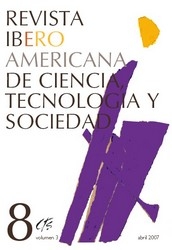Conhecimento, Cooperação e Desenvolvimento
DOI:
https://doi.org/10.52712/issn.1850-0013-954Palavras-chave:
conhecimento, cooperação internacional, processos de desenvolvimentoResumo
As estratégias de cooperação internacional têm se baseado majoritariamente em teorias sobre o desenvolvimento que consideram o conhecimento como um elemento central para a melhoria das condições de vida e para o progresso econômico e social. Este artigo avalia as limitações e os alcances dessas teorias. Para isso, analisa as implicações das abordagens formuladas por organismos internacionais e agências de cooperação no campo da cooperação científica e tecnológica.
Downloads
Referências
ARCHIBUGI, D., PIETROBELLI, C. (2003): “The Globalisation of Technology and its implications for Developing Countries”, Technological Forecasting and Social Change, 70: 861-883.
AROCENA, R., SUTZ, J. (2002): Subdesarrollo e innovación. Navegando contra el viento, OEI/Cambridge University Press, Madrid.
BANCO MUNDIAL (1999): El conocimiento al servicio del desarrollo. Informe sobre el desarrollo mundial, Ediciones Mundi-Prensa, Madrid.
BANTHIEN, H., JASPERS, M., RENNER, A. (2003): Governance of the European Research Area: The role of civil society, Final Report, Institute for Organisational Communication, Bensheim.
BARRÉ, R. (2001): “The Agora model of innovation systems: S&T indicators for a democratic knowledge society”, Research Evaluation, 10: 13-18.
CHILD, J., FALKNER, D. (1998): Strategies of co-operation: managing alliances, networks and joint ventures, Oxford University Press, UK.
CHOO, C. W. (1998): The Knowing Organization, Oxford University Press, Nueva York.
EUROPEAN COMMISSION (2004): Research for Development: from challenges to policies, Bruselas.
FREEMAN, C., SOETE, L. (1997): The Economics of Industrial Innovation, MIT Press, Cambridge, Mass.
FULLER, S. (1999): The Governance of science : Ideology and the future of the open society, Open University Press, Buckingham, UK.
GIBBONS, M., LIMOGES, C., NOWOTNY, H., SCHWARTZMAN, S., SCOTT, P., TROW, M. (1994): The New Production of Knowledge: The Dynamics of Science and Research in Contemporary Societies, Sage Publication, Londres.
GÓMEZ, H., H. JARAMILLO (1997): 37 modos de hacer ciencia en América Latina, TM Editores, Bogotá.
IRWIN, A., MIKE, M. (2003): Science, Social Theory and Public Knowledge, Open University Press, Maidenhead, UK.
JASANOFF, S. [editor] (2004): States of Knowledge: The Co-Production of Science and Social Order, Routledge, Londres.
JUMA, C., FANG, K., HONCA, D., HUETE-PEREZ, J., KONDE, V., LEE, S.H., ARENAS, J., IVINSON, A., ROBINSON, H., SINGH.GLOBAL, S. (2001): “Governance of Technology: Meeting the Needs of Developing Countries”, International Journal of Technology Management, 22: 629-655.
JUMA, C., YEE-CHEONG, L. [editors] (2005): Innovation: applying knowledge in development, Millenium Project, Earthscan, Londres.
KIM, L., NELSON, R.R. (2000): Technology, Learning and Innovation: Experiences of Newly Industrializing Economies, Cambridge University Press, New York.
LÓPEZ CEREZO, J.A., SÁNCHEZ RON, J.M. [editores] (2001): Ciencia, Tecnología, Sociedad y Cultura, Organización de Estados Iberoamericanos, Madrid.
MUÑOZ, E., SANTESMASES, M.J., LÓPEZ FACAL, J., PLAZA, L.M., TODT, O.(2005): El espacio común de conocimiento en la Unión Europea. Un enfoque al
problema desde España, Academia Europea de Ciencias y Artes, Madrid.
NOWOTNY, H., SCOOT, P., GIBBONS, M. (2001): Re-Thinking Science: Knowledge and the Public in an Age of Uncertainty, Polity, Cambridge.
PALIS, J., SERAGELDIN, I. (2004): Inventing a Better Future: A Strategy for Building Worldwide Capacities in Science and Technology, InterAcademy Council, Londres.
SAGASTI, F. (2004): Knowledge and Innovation for Development: The Sisphus Challenge of the 21st Century, Edward Elgar Publishers, Chiltenham, U.K.
SALOMON, J.J., SAGASTI, F., SACH, C. (1996): La búsqueda incierta. Ciencia tecnología y desarrollo, Fondo de Cultura Económica, México.
SALOMON, J.J. (1994): “Tecnología, diseño de políticas y desarrollo”, Arbor, Vol.1, Nº 1, pp. 9-26.
SEBASTIÁN, J. (2004): Cooperación e Internacionalización de las Universidades, Editorial Biblos/SECIB, Buenos Aires. Argentina.
SEBASTIÁN, J. (2000): “La cultura de la cooperación en la I+D+i”, Espacios. Revista venezolana de gestión tecnológica, Caracas. Vol. 21, Nº 2, 165-180.
SEBASTIÁN, J. [editor] (2000): Ciencia y tecnología para un gobernabilidad democrática, Cuadernos de Gestâo Tecnológica, Nº47, NPGCT, Universidad de Sâo Paulo.
SEBASTIÁN, J., BENAVIDES, C. (2005): “Propuesta de estrategia española para el fomento de la cooperación científica y tecnológica al desarrollo”, Informe para la Agencia Española de Cooperación Internacional, Madrid.
SUTZ, J. (1997): Innovación y desarrollo en América Latina, Editorial Nueva Sociedad, Caracas.
UNCTAD (1998): New approaches to science and technology cooperation and
capacity building, Ginebra.
UNITED NATIONS DEVELOPMENT PROGRAMME (2001): Making Technologies Work for Human Development, Oxford University Press, New York.
WATSON, R., CRAWFORD, M., FARLEY, S. (2003): Strategic approaches to science and technology in development, The World Bank, Washington.
Downloads
Publicado
Como Citar
Edição
Seção
Licença
Copyright (c) 2025 CC Attribution 4.0

Este trabalho está licenciado sob uma licença Creative Commons Attribution 4.0 International License.
Todas os números de CTS e seus artigos individuais estão sob uma licença CC-BY.
Desde 2007, a CTS proporciona acesso livre, aberto e gratuito a todos seus conteúdos, incluídos o arquivo completo da edição quadrimestral e os diversos produtos apresentados na plataforma eletrônica. Esta decisão é baseada no entendimento de que fornecer acesso livre aos materiais publicados ajuda a ter uma maior e melhor troca de conhecimentos.
Por sua vez, em se tratando da edição quadrimestral, a revista permite aos repositórios institucionais e temáticos, bem como aos sites pessoais, o autoarquivo dos artigos na versão post-print ou versão editorial, logo após da publicação da versão definitiva de cada número e sob a condição de incorporar ao autoarquivo um link direcionado à fonte original.











